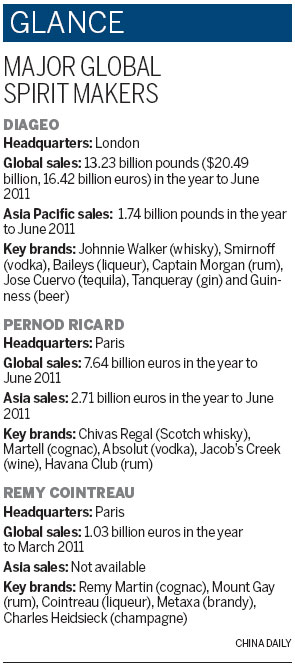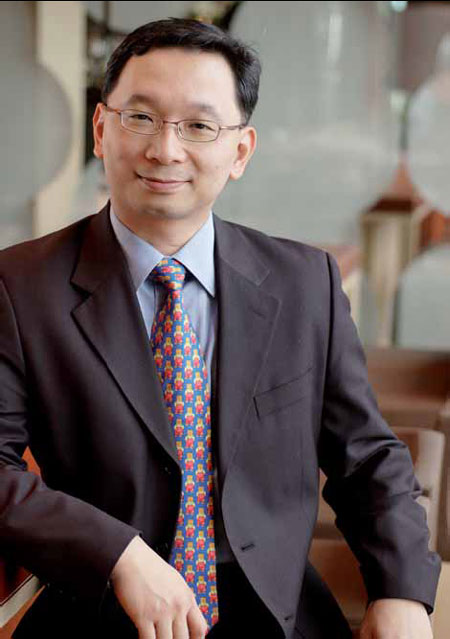Dash of tea that tamed them all
Updated: 2012-06-22 16:55
By Cecily Liu (China Daily)
|
|||||||||||
|
Pernod Ricard's Horace Ngai says Chivas Regal Green Tea mix is customized for the Chinese market. Provided to China Daily |

An exotic drink mix that respectfully bowed to chinese tradition has proved to be a winner
Its smooth and honeyed taste has captured the imagination of China's new rich, for whom holding it in a cut-crystal glass symbolizes the exuberance of modern life.
From Beijing's art galleries to Shanghai's dance floors, it has become the toast.
But little known is the story of how the scotch whisky Chivas Regal revolutionized the perception of scotch in China and secured the top import spirits position for its parent company, Pernod Ricard, in little more than a decade.
It was a pioneerin importing spirits to China, recalls Horace Ngai, deputy managing director of Pernod Ricard China, as he sat back to relax after a half-day news conference in Aberdeen, home of Chivas Regal.
The year was 2001, when Paris-based Pernod Ricard and London-based Diageo split up the old Seagram's drinks empire in a move that also gave the French group Chivas Regal.
"We were very young in China back then," Ngai says. Despite acquiring Seagram's existing market in China, the company's sales lagged behind MHD (the joint venture Moet-Hennessey and Diageo established in China) and Remy Cointreau.
Moreover, the high prices and the unfamiliar taste of foreign spirits posed a common challenge to all international brands, capping total imports at less than 1 percent of China's spirits consumption.
Pernod Ricard took a gamble with Chivas Regal 12 years old, believing the drink's round and creamy taste would suit Chinese taste buds, and its message "Live with Chivalry" would engage the nation's affluent drinkers who search for more than worldly success.
To find the best mixer, Pernod Ricard opened a whisky bar in Beijing in 2002, where a team of bartenders offered visitors Chivas Regal blended with all possible juices, soft drinks and spices.
"We probably tried hundreds. We didn't have R&D (research and development), but we created out own R&D," Ngai says.
The winning mix was Chivas Regal Green Tea, a sweet jasmine flavored drink that bows to Chinese tradition but sounds modern, not to mention the health connotations.
To recruit new whisky drinkers, Pernod Ricard persuaded its contract outlets to reduce the drink-in prices of the standard 700 milliliter Chivas Regal 12 bottle, sometimes by 50 percent.
"We had to educate the outlets to get out more bottles, to increase the customer flow, and that was actually the more effective way of turning over for the outlets," Ngai says.
Meanwhile, Pernod Ricard invested heavily to promote the Chivas Regal Green Tea mix through advertising, themed parties and tasting sessions.
"With the best DJ, and the best party, we made Chivas Regal the icon of trendy life," Ngai boasts.
From 2003 onwards, China's economic boom created an expanding group of internationally minded middle-class consumers who preferred whisky to China's fiery white spirit baijiu.
China's imports of scotch rose to more than $85 million (67.6 million euros) in 2010 from $2.9 million in 2001, according to the Scotch Whisky Association, based in Britain.
Suddenly, Chivas Regal Green Tea made inroads into nightclubs and karaoke bars nationwide, and Pernod Ricard's contract outlets expanded "exponentially" from less than 200 in 2002 to 10 times as many now.
This boom pushed Pernod Ricard's market share in China ahead of MHD and Remy Cointreau to top the import spirits league table. According to the company's own estimates last year, its volume share of China's import spirits market stood at 48 percent.
China also became Chivas Regal 12's biggest market, which is striking given China is only the world's eighth largest whisky market with 3.2 percent global share, according to 2010 data from the London-based International Wine & Spirit Research.
Pernod Ricard then expanded its whisky portfolio in China to include Royal Salute, a prestige drink launched in tribute to Queen Elizabeth II, and Ballantine's, a smooth drink associated with polo.
"But that was only for the first seven years," Ngai says
As China's affluent professionals grew older and more discerning in their taste, the nation's market for French cognac outperformed that of whisky toward the end of last decade.
In 2011 China's cognac market grew 21.5 percent to 2.3 million cases, according to International Wine & Spirit Research.
Whisky, meanwhile, grew a more modest 2.3 percent to 1.9 million cases.
Against strong competition from two established rival cognacs, Hennessey (of MHD) and Remy Martin (of Remy Cointreau), Pernod Ricard invested heavily in its own cognac Martell, particularly in the second half of last decade.
It invited China's wealthiest consumers to themed Martell parties across the country. "So it could be cigar and cognac, it could be shark fins and cognac, it could be qipao and cognac," Ngai says, waving his hands in the air.
Some at the parties were dedicated Martell drinkers, but many were loyal drinkers of rival cognacs, whose details were passed on to Pernod Ricard by its contract outlets which also distributed rival cognacs.
Many non-Martell drinkers were thus converted.
Pernod Ricard also trained a team of account managers to help Martell clients with daily tasks, like booking a restaurant table, ordering flowers, or organizing an event.
"People earn money in China, but they don't know how to spend," Ngai says. "They buy things, but that doesn't really get them the substance. There was this emptiness, when you have too much money and didn't know what to do with it."
Hence having an account manager who becomes one's friend and lifestyle consultant was desirable to China's affluent consumers.
"Those beautiful ladies are amazing. We called them the Martell Angels," Ngai says.
In January Martell crossed the 1 million case mark in China, becoming the first imported spirit brand to do so. In value terms, it now runs neck and neck with Hennessey for top spot, both having market share of 30 percent plus.
Meanwhile, in the whisky market, Diageo's Johnnie Walker is investing heavily to challenge Chivas Regal's leadership. Last year Diageo opened a Johnnie Walker House in Shanghai where guests are invited to private tastings of pricey bottles, such as the $2,000 limited-release 1910 Edition Scotch whisky.
Unlike Diageo, Pernod Ricard is focusing its resources on expansion into smaller Chinese cities such as Kunming and Guiyang, so to "penetrate deeper inland and influence a wider population".
It now has a presence in more than 400 Chinese cities, supported by more than 550 sales representatives and 1,700 promoters.
With inland expansion led by the popular Chivas Regal 12, Pernod Ricard has continued to widen its premium portfolio in the wealthiest cities.
Pernod Ricard's brand subsidiary Orlando Wines launched a China-specific wine range designed to accompany Chinese food, called the Jacob's Creek Winemaker's Selection.
The Chivas Regal collection was also extended to include Chivas Regal 18 years old, Chivas Regal 25 years old and Chivas Regal James & John.
cecily.liu@chinadaily.com.cn
(China Daily 06/22/2012 page20)
Today's Top News
Rescuers race against time for quake victims
Telecom workers restore links
Coal mine blast kills 18 in Jilin
Intl scholarship puts China on the map
More bird flu patients discharged
Gold loses sheen, but still a safe bet
US 'turns blind eye to human rights'
Telecom workers restore links
Hot Topics
Lunar probe , China growth forecasts, Emission rules get tougher, China seen through 'colored lens', International board,
Editor's Picks

|

|

|

|

|

|






